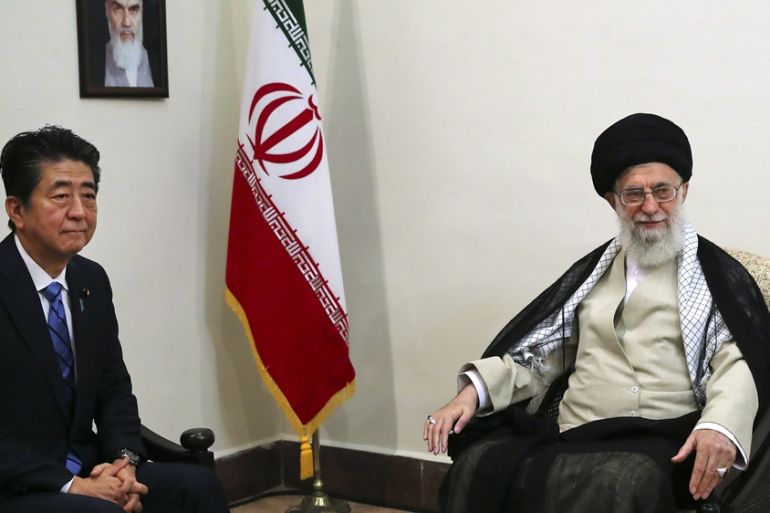Iran has ‘no intentions’ to make or use nuclear weapons, Abe says
Japanese PM Shinzo Abe said Iran’s Supreme Leader made the comment during a meeting in Tehran.

Iran’s Supreme Leader Ayatollah Ali Khamenei has assured Japanese Prime Minister Shinzo Abe that Iran has no intention to make, hold or use nuclear weapons, while saying that the country will not negotiate with the United States.
Abe met Khamenei – Iran’s top decision-maker – on Thursday during a trip to Iran in an attempt to ease tensions between the Islamic republic and the US.
Keep reading
list of 4 itemsWhy are nations racing to buy weapons?
Parallel economy: How Russia is defying the West’s boycott
US House approves aid package worth billions for Ukraine, Israel
Following the meeting, which Iranian President Hassan Rouhani appeared to have also attended, Abe told reporters that Khamenei had told him that Iran “will not and should not make, hold or use nuclear weapons, and that it has no such intentions”.
Shortly after, Iranian state news agency FARS confirmed the comment, but added that Khamenei had said Iran will not negotiate with the US and did not consider President Donald Trump “worthy” of a message from Tehran.
“I do not see Trump as worthy of any message exchange, and I do not have any reply for him now or in the future,” Khamenei was quoted as saying.
The supreme leader also reportedly said that he does not believe Trump’s offer of honest negotiations and that he thinks the US president’s promise not to seek regime change in Iran is a lie.
The comments likely came as a blow to Abe, who told reporters at a joint press conference with Rouhani on Wednesday, that helping to ease tension in the region was “the one single thought that brought me to Iran”.
Abe is completing a two-day visit to Iran, becoming the first sitting Japanese premier to visit the country since its 1979 Islamic Revolution.
Meeting with Mr. @AbeShinzo, the Prime Minister of Japan pic.twitter.com/6lTsxR7L0J
— Khamenei.ir (@khamenei_ir) June 13, 2019
Since withdrawing from a landmark 2015 nuclear deal, Trump has reimposed crippling sanctions on Iran and deployed troops and aircraft carriers to the Gulf.
In response, the Iranian Foreign Minister Javad Zarif warned on Monday that the US could not expect to “stay safe” while imposing an “economic war” on Iran and said that Iran would not engage in any talks unless the US was prepared to make concessions.
Mediation mission
Japan is a key US ally in the Asia Pacific region and Abe appears to enjoy a good relationship with Trump, who has said the pair have “very, very good chemistry”.
Abe secured Trump’s blessing for his mediation mission during the latter’s visit to Japan in May. Japan’s chief cabinet secretary, Yoshihide Suga, said the pair had spoken about Iran by telephone on Tuesday.
Japan has also traditionally had good ties with Iran, having once been a substantial buyer of Iranian oil, until it was forced by US sanctions to halt purchases.
Speaking at Wednesday’s joint press conference, Rouhani said that he saw Japanese interest in continuing to buy oil as a “guarantee” for the ongoing development of bilateral ties.
Takeshi Osuga, the spokesman for Japan’s foreign ministry said that deciding on oil purchases was the domain of private companies.

As the first leader of a G7 country to visit the Islamic Republic since Trump’s withdrawal from the nuclear deal, Abe is the most high-profile representative of recent diplomatic efforts to engage Iran amid the rising tensions.
His visit comes hot on the heels of German Foreign Minister Heiko Maas, who held talks on saving the nuclear deal in the Irainan capital, Tehran, on Monday.
Helga Maria Schmid, a top European Unionforeign policy official at the helm of bloc efforts to save the deal, is also due to travel to Iran this week.
|
|
The visits are an indicator of the extent of international concern over tensions apparently escalating in the Gulf.
Reports emerged on Thursday of an incident that required two tankers in the Gulf of Oman to be evacuated.
One of the vessels was operated by a Japanese shipping company.
Also on Thursday, Saudi Arabia warned of “grave consequences” for Iran after a missile attack by Iran-backed Houthi rebels in Yemen hit a Saudi airport and wounded 26 people a day earlier.
At the press conference with Rouhani on Wednesday, Abe said it was “essential” that Iran plays a “constructive role in building solid peace and stability in the Middle East,” noting that a conflict “might be triggered accidentally”.